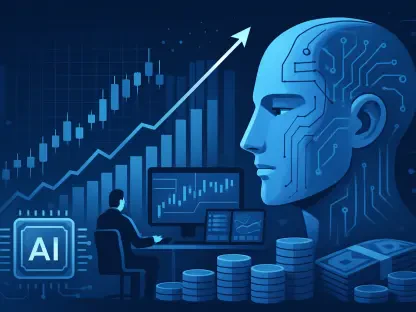Introduction
Imagine a world where complex regulations in healthcare, finance, and legal sectors are navigated with pinpoint accuracy, thanks to cutting-edge technology that anticipates needs before they arise. This is the reality being shaped by Wolters Kluwer, a global leader in information services, as it harnesses artificial intelligence (AI) to transform operations in highly regulated industries. The integration of AI into core business functions is not just a trend but a necessity for staying competitive in environments where precision and compliance are paramount. This FAQ article aims to address key questions surrounding Wolters Kluwer’s innovative AI strategies, offering insights into how the company is setting new standards. Readers can expect to explore the depth of AI integration, the tools driving this change, and the implications for efficiency and workforce dynamics in regulated sectors.
The significance of this topic lies in the growing reliance on AI to solve intricate challenges in industries bound by strict rules. With regulatory demands becoming increasingly complex, understanding how a company like Wolters Kluwer leverages technology to maintain compliance while boosting productivity is essential. This content will guide readers through the critical aspects of AI adoption, from governance to practical applications, providing a clear picture of what this means for businesses and professionals today.
Key Questions or Key Topics
What Makes Wolters Kluwer’s AI Integration Unique?
In many organizations, AI is often treated as an add-on feature, but Wolters Kluwer has taken a distinctly different path by embedding AI directly into the heart of its products. This deep integration, which has been a focus for over a decade, ensures that AI is not merely a superficial layer but a fundamental component of platforms like the Tax & Accounting division’s Firm Intelligence initiative. This approach allows the technology to anticipate workforce and customer needs using proprietary content and predictive analytics, setting the company apart in regulated industries.
The impact of this strategy is evident in the substantial portion of digital revenue—approximately 50%—attributed to AI-driven solutions. By prioritizing seamless incorporation over temporary enhancements, Wolters Kluwer ensures that its tools deliver consistent value, particularly in sectors where accuracy and foresight are critical. This method addresses the challenge of maintaining relevance in fast-evolving markets while adhering to stringent regulatory standards.
How Does the AI Toolbox Enhance Flexibility?
A standout element of Wolters Kluwer’s approach is the development of an AI toolbox, a collection of specialized models and tools tailored for specific tasks. Unlike relying on a single, all-purpose AI solution, this modular framework includes options like large language models, automated test assistants, and domain-specific applications. The flexibility of this system allows for customized solutions that optimize performance across diverse functions in regulated environments.
This toolbox addresses the limitation of one-size-fits-all AI by enabling adaptability in a rapidly changing technological landscape. For instance, different tools can be deployed for tasks ranging from data analysis to compliance checks, ensuring precision where it matters most. The strategy reflects an understanding that varied challenges in industries like healthcare and finance require nuanced, adaptable responses rather than uniform approaches.
What Are the Core Principles of Responsible AI at Wolters Kluwer?
Responsible AI deployment stands as a cornerstone of Wolters Kluwer’s technology strategy, especially given the high stakes of regulated sectors. The company has established clear principles focusing on transparency, explainability, privacy, fairness, governance, and human-centric design. These guidelines are supported by an AI Center of Excellence, which collaborates with global security teams to create robust frameworks that ensure safe and predictable AI operations.
To mitigate risks, initial controls are set tightly, prioritizing security and compliance before adjustments are made based on rigorous testing with edge cases. Human oversight remains essential, particularly in areas like testing AI-generated code, ensuring that ethical considerations are never sidelined. This structured approach tackles the challenge of balancing innovation with accountability, a critical concern in industries where errors can have significant consequences.
How Is AI Transforming Software Development Processes?
AI is reshaping software development at Wolters Kluwer by significantly enhancing efficiency and reducing errors. The use of AI-assisted code generation has targeted a 25% reduction in coding time, a goal seen as achievable based on early outcomes. This technology proves especially valuable for repetitive, entry-level tasks, freeing junior developers to tackle more creative and complex projects sooner in their careers.
Beyond time savings, the company employs a DevSecOps strategy that integrates AI-driven testing and strict quality checks to maintain high standards for both machine- and human-generated code. While no positions have been eliminated due to AI, there has been a reduction in open developer requisitions, redirecting focus toward higher-value activities. This shift addresses the challenge of optimizing resources while fostering innovation within development teams.
What Impact Does AI Have on Workforce Dynamics and Skills Gaps?
AI is not viewed as a replacement for human roles at Wolters Kluwer but rather as a means to augment capabilities and address skills gaps. The rapid increase in internal AI knowledge has empowered software engineers and technical staff, enhancing their ability to handle complex tasks. Over time, this is expected to reduce dependency on specific engineering roles, both internally and externally, promoting greater team flexibility.
Additionally, AI tools are enabling employees to shift focus from mundane tasks to strategic, high-value work, reshaping traditional job structures. This transformation tackles the challenge of evolving workforce needs in technology-driven industries, ensuring that talent is utilized effectively. The emphasis on upskilling reflects a proactive stance on preparing teams for the demands of a digital era.
How Does Wolters Kluwer Manage Risk and Compliance with AI?
In regulated sectors, managing risk and ensuring compliance are non-negotiable, and Wolters Kluwer addresses this through stringent security measures for its proprietary data. By using only internal data for AI training, the company minimizes exposure while maintaining the integrity of its vast information reserves. This approach is vital for safeguarding sensitive content in industries like legal and healthcare, where breaches can be catastrophic.
Governance policies, driven by the AI Center of Excellence, ensure that AI usage aligns with regulatory and ethical standards. These frameworks balance the drive for innovation with the need for accountability, addressing the challenge of operating within strict legal boundaries. Such measures provide a model for how technology can be harnessed responsibly without compromising on safety or trust.
What Role Do AI Agents and Orchestrators Play in Operations?
AI agents and orchestrators—systems that coordinate multiple AI tools for complex workflows—are pivotal in enhancing operational efficiency at Wolters Kluwer. These technologies improve processes in areas such as service desk operations, incident management, and disaster recovery. Their ability to streamline tasks addresses the challenge of managing intricate systems in high-pressure regulated environments.
However, integrating these systems with diverse models and data sources poses ongoing difficulties, particularly in ensuring interoperability. Careful attention to cohesive workflows is necessary to maximize the benefits of such tools. This focus on orchestration highlights a broader industry need for seamless coordination as AI becomes more embedded in business operations.
Summary or Recap
This discussion highlights several critical insights into Wolters Kluwer’s pioneering use of AI in regulated industries. The deep integration of AI into core products drives significant digital revenue and sets a benchmark for innovation, while the AI toolbox offers a flexible, task-specific approach to technology deployment. Responsible AI principles, supported by strong governance, ensure that risks are managed effectively, maintaining compliance in stringent sectors.
Key takeaways include the transformative effect of AI on software development, where efficiency gains and error reduction are prioritized, and the positive shift in workforce dynamics, with employees focusing on higher-value tasks. Data quality remains the foundation of successful AI outcomes, underscoring the importance of robust strategies in digital transformation. For those seeking deeper knowledge, exploring resources on responsible AI frameworks and industry-specific AI applications is recommended to understand the broader implications of these advancements.
Conclusion or Final Thoughts
Looking back, Wolters Kluwer’s journey with AI demonstrates a thoughtful balance between innovation and responsibility, setting a powerful example for others in regulated industries. The emphasis on embedding technology into core operations, coupled with strict governance, provides a roadmap for navigating complex regulatory landscapes successfully. This approach not only enhances efficiency but also redefines how roles and skills are perceived within the organization.
Moving forward, businesses and professionals should consider adopting modular AI strategies tailored to specific needs, ensuring that flexibility remains a priority in technology adoption. Evaluating data quality and establishing clear ethical guidelines are proven steps that can safeguard against potential pitfalls. Reflecting on how these strategies apply to individual or organizational contexts might reveal opportunities for similar transformation, paving the way for sustainable progress in an AI-driven world.









